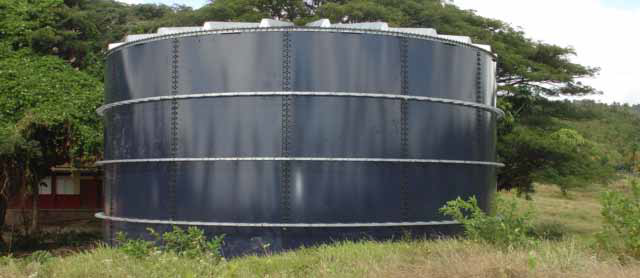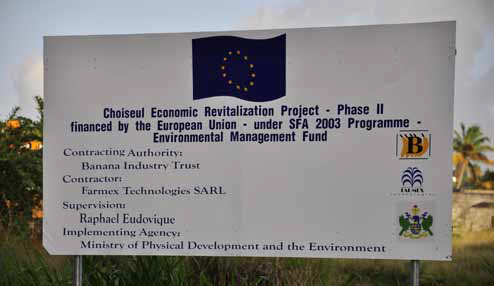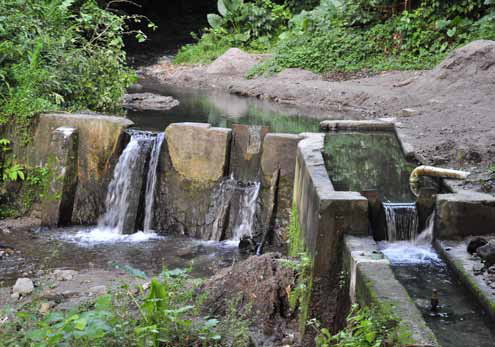
Choiseul Economic Revitalization Project
OverviewIn many rural communities, the principal economic activity consists of mainly aging small producers being forced to make a living in an extremely challenging, fragile and rapidly deteriorating natural environment, dwindling freshwater resources, inappropriate land husbandry practices, inadequate resource management support systems, and limited facilities, incentives and production support services. The rural community of Delcer is one such community whose economic activity consists of mainly aging small producers, although there is some evidence that the younger generation is showing some interest in continuing the work of their forefathers.
There is one water intake within the gently sloping “watershed” of Choiseul that is used to supply pipe borne water to residents of the surrounding communities along with providing water for irrigation purposes. This drainage basin is not protected from human activity and as a result the water is extremely turbid during rainfall periods. The absence of adequate forest cover in the village of Choiseul, along with poor waste, land, and soil management practices adopted by resource users who utilizes the watercourse, are the main causes of the environmental degradation and resultant acute water problems experienced in this “watershed”.


Within recent decades, the Government of Saint Lucia has instituted major policy and policy support interventions to transform the rural economy. These interventions have included measures to promote the conservation, improvement and sustainable utilization of the fragile and limited ecological resources in these areas, including land, water and genetic resources.
In an effort to contribute to more sustainable livelihoods in the southwest, rural community of Choiseul and its surrounding areas through sustainable usage of the Anse L’Ivrogne River for agricultural purposes, the Economic Revitalization Project was put in place in Choiseul by the provision of the EU SFA 2003 funding grant programme and managed by the Banana Industry Trust. The project was set in two phases: – (1) the implementation of a feasibility and design study water distribution system; and (2) the installation of a 150,000 gallon water storage tank with 9,385 feet of water transmission pipeline connection. In addition, 13,000 feet of pipes with fittings were supplied to farmers to facilitate the network for the connection to the main transmission pipeline that would enable them to irrigate their holdings.
The feasibility and design Study was done by Water Engineer, Raphael Eudovique.
The project was awarded to FARMEX technologies SARL of France who were also the contractors for Anse La Raye Water Supply Improvement Project. Technical support was provided by Raphael Eudovique, in conjunction with the Ministry of Agriculture. Oversight for the project, which was completed in December 2009, was provided by the Office of the National Authorizing Officer in the Ministry of Economic Planning.
The project was geared towards the revitalization of economic and social activity in the Choiseul municipal district through the direct involvement and combined efforts of the major indigenous development promoting agencies in the community and the youth. It also sought to promote more sustainable, diverse livelihood systems, through the effective use and efficient management of the fragile, finite and limiting natural resource base, particularly land and water resources.
Read More
The water scarcity in this subregion has resulted in widespread disillusionment and despondency particularly among the youth, along with mass migration and other readily identifiable perverse manifestations. These include poor resource management practices, decreasing soil fertility and increasing land and ecological degradation. According to the Executive Officer of BIT, Bertram Clarke, “This project should arrest these problems and contribute substantially to the revitalization of rural livelihood, sustainable economic growth and more equitable and balanced community development.”
For very compelling reasons, the south-western corridor of the island, inclusive of the village of Choiseul, has been specifically targeted because of the peculiar developmental and environmental challenges in these areas. Like most of the outlying rural communities on the central and south-western coast of the island, the village of Choiseul lags behind the rest of the island in terms of economic and social advancement. Much of this community appears to be untouched by the significant socio-economic strides made by the rest of the country since Independence.
Activities on the part of Government, community-based organizations, or business groups to improve the economic health of an impoverished area are an important aspect of community development. Typically, such programmes aim to entice businesses to relocate or remain in the economic development zone, improve the occupational and academic skills of local residents, encourage the creation and retention of new jobs, and encourage entrepreneurship and the formation of new businesses. A wide variety of tax credits, hiring subsidies, property improvement and other incentives may be cited. In the case of Delcer, and the surrounding areas, it was the improvement of the water resources which can only amount to positive change for all.

